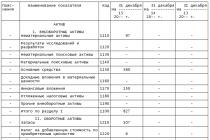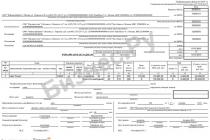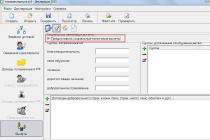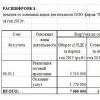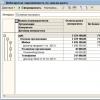Sample documents with which you can write off accounts payable without causing unnecessary claims from the tax authorities.
Overdue accounts payable, for which the limitation period has passed, the company must include in non-operating income (clause 18, article 250 of the Tax Code of the Russian Federation). This must be done strictly in the reporting period when the limitation period has passed, as the Ministry of Finance of Russia reminded in a letter dated January 28, 2013 No. 03-03-06 / 1/38.
Therefore, an inventory is recommended to be carried out at the end of each reporting period. That is, quarterly or monthly, depending on which period is the reporting period for the company. Thus, it is possible to timely identify accounts payable for which the statute of limitations has expired.
Earlier we already wrote about how you can write off accounts payable without causing, at the same time, complaints from the tax authorities. In this article, we will take a closer look at what documents are needed to write off a bad debt, and what is the procedure for processing them.
First of all, it is necessary to conduct an inventory of settlements with debtors and creditors. Its essence is to correlate the amounts of receivables and payables on the accounting accounts with the actual figures. The inventory of settlements includes settlements with banks, with the budget and extra-budgetary funds, with buyers and customers, with other debtors and creditors, etc.
When checking calculations, you need to install:
- whether the debit and credit balances on the accounts of settlements on the balance sheet, the balances in the turnover sheets are equal, the debt for which the statute of limitations has expired will also be revealed here;
- the correctness and validity of the accounting debt for shortages and theft, if any.
The results of the inventory must be formalized using the act. Since from this year unified forms of primary documents have become optional, the act can be drawn up in the form approved in the company's accounting policy. If the organization continues to use standard forms, then you can use the form No. INV-17 “Inventory Act of Settlements with Buyers, Suppliers and Other Debtors and Creditors”, approved by the Decree of the State Statistics Committee of Russia dated August 18, 1998 No. 88. An example of such an act is given below.

In addition to the act of inventory, it is necessary to prepare an accounting statement. It contains all the necessary information about the debt, namely, under which contract this debt arose, as well as links to invoices, acts or other primary documents.
You also need to calculate the limitation period, thereby justifying why the company takes into account the debt in the income of the current period. The accounting statement should look like this.

In order not to be mistaken in the calculation of income tax, the accountant needs to correctly determine the limitation period for debts. As a basis, you can take the rules that are established in the Civil Code.
First of all, it is necessary to determine the period within which the company had to fulfill its obligation to the counterparty in accordance with the terms of the contract. Perhaps the contract has been amended, and then you need to check the texts of additional agreements to it. It is possible that the original period in them was extended.
In fact, the debt to the counterparty could arise not on the date specified in the contract, but, for example, at the moment when the goods were received from the supplier. But according to paragraph 2 of Article 200 of the Civil Code of the Russian Federation, it is the contractual period that matters for calculating the limitation period.
The limitation period itself must be considered from the day after this contractual period has passed. As a general rule, the statute of limitations is three years, as prescribed in article 196 of the Civil Code of the Russian Federation.
The limitation period may be interrupted if the company recognizes its debt to the counterparty. Then, according to Article 203 of the Civil Code of the Russian Federation, the statute of limitations must be recalculated. This gives the company a legal opportunity to defer the payment of income tax on accounts payable for three years. It is enough to confirm the existence of this debt in any way.
What actions confirm the debt is not established in the law, but an approximate list is in paragraph 20 of the decision of the Plenum of the Supreme Court of the Russian Federation of November 12, 2001 No. 15, the Plenum of the Supreme Arbitration Court of the Russian Federation of November 15, 2001 No. 18.
So, for example, to confirm a debt to a counterparty, you can send a letter of guarantee to the counterparty, in which the company confirms its debt and indicates the period during which it is planned to repay it. The same can be said about the situation when the counterparty is transferred at least part of the amount for the goods delivered to him, or a penalty is paid for late payment.
Another limitation period can be interrupted by drawing up a reconciliation act. The fact is that, ideally, the reconciliation act should be signed by the head of the company. In practice, this document is often signed by the chief accountant. In such cases, judges may consider that the statute of limitations is not interrupted. An example is the resolution of the Federal Antimonopoly Service of the West Siberian District of July 22, 2009 No. Ф04-4295 / 2009 (10770-А67-50).
Therefore, if the company wants to postpone the payment of tax on overdue accounts payable, then the reconciliation act must be signed by the head, and also make sure that the director also certified this document on the part of the counterparty. In this case, you can accurately focus on the date of the reconciliation act for the purposes of tax accounting.
When the amount of bad debt is confirmed, it remains only to issue an order to write it off. After that, the following posting is made in accounting:
DEBIT 60 (76) CREDIT 91 sub-account "Other income"- written off accounts payable.
This entry writes off accounts payable for which the statute of limitations has expired to other income.



